 Bridgnorth Aluminium factory floor
Bridgnorth Aluminium factory floorPresident Trump’s 25% tariffs on steel and steel derivative products have today come into effect, with no exemptions granted to the UK or any other trading partners. These will potentially have hugely damaging consequences for UK suppliers and their customers in the USA. The tarrifs will also have a further harmful indirect effect of deflecting steel trade from the USA into markets like the UK. Further reciprocal tariffs are expected to be announced by the USA on 2 April.
The USA is the UK’s second most important export market for steel after the European Union (EU), particularly as it is a high value market. US exports account for 9% of UK steel exports by value and 7% by volume. This is mostly specialist steel that goes into areas such as defence, oil and gas, construction equipment and packaging. At a time of already highly challenging market conditions, with global overcapacity and oversupply, high energy costs, and weak demand, the blow to UK exports is all the more detrimental.
Meanwhile, the UK is only partially shielded from trade diversion. Steel safeguard quotas have been liberalised every year and are now 22% larger than when they were first introduced in 2018. All while UK demand has contracted by 16%. These quotas are oversized and do not offer adequate protection from the large-scale trade diversion that is likely to take place.
Concrete plansCurrent steel safeguards will lapse in June 2026, so
UK Steel says it is essential that the existing measures are tightened, as the EU is doing, and concrete plans are put in place for their replacement, ideally well before the expiry date. There is a huge amount of momentum around steel in the EU, including its Steel and Metals Action Plan which will are due to be presented on 19 March. This will further add to the pressure both on the UK’s direct exports, as well as its trade defences.
UK Steel director general Gareth Stace said: “Today’s imposition of tariffs on UK steel from the US administration is hugely disappointing. President Trump must surely recognise that the UK is an ally, not a foe. Our steel sector is not a threat to the USA, but a partner to key customers, sharing the same values and objectives in addressing global overcapacity and tackling unfair trade.
“These tariffs couldn’t come at a worse time for the UK steel industry, as we battle with high energy costs and subdued demand at home, against an oversupplied and increasingly protectionist global landscape. What is more, the EU is also pushing ahead with trade restrictive action that will amplify the impact of US tariffs.
“It is essential that the UK Government not only continues efforts to negotiate exemptions with the USA, but also takes decisive action to bolster our trade defences. We greatly appreciate all the efforts that have been made so far and will continue working closely with the Government to secure the best possible outcome.”
Creating uncertaintyBridgnorth Aluminium operates the only fully integrated aluminium coil rolling plant in the UK and employs 330 people in Shropshire. The company sells 20% of its volumes into the USA and the introduction of aluminium and steel tariffs will create uncertainty and, potentially, makes the business less competitive than the current system of quota and exemptions.
Adrian Musgrave, head of sales at Bridgnorth Aluminium, said: “These tariffs add another dimension to the global uncertainty we are all currently dealing with. If there is no movement on the 25% rate it will make trading with the US more difficult for us as a business, but it could also cause supply and cost issues for firms in the USA too. For example, for a significant portion of our US sales, there is currently no US producer. This means there is no threat to domestic aluminium production, yet companies using our aluminium may soon be hit by rising costs.
“What would we like to see? A deal between the UK and the USA that removes tariffs all together or significantly reduces it from the 25% rate. This is something we are championing with the Department for Business and Trade and key manufacturing bodies, such as the Aluminium Federation (ALFED). Confederation of British Metalforming and Make UK. We are grateful for the engagement of the UK Government and the manufacturing associations, who are all lobbying hard on our behalf.”
Significant impactJamie White, managing director of
Exactaform, which counts Airbus, BAE Systems, Red Bull and McLaren among its customers, said: “The introduction of a 25% tariff on aluminum and steel will have a significant impact on the UK’s high-tech manufacturing industries, particularly aerospace and automotive. These sectors rely on precision-machined components where material costs and supply chain efficiency are critical.
“With aerospace manufacturers already managing complex global supply chains, any additional cost pressures could affect competitiveness and production lead times. For the automotive sector, where weight reduction is key for performance and efficiency, the increased cost of aluminum will make sourcing and manufacturing more challenging.”
He concluded: “As a cutting tool manufacturer supplying major aerospace and automotive firms, we are positioned right at the start of the supply chain, meaning we will see these changes take effect in real time. If tariffs result in increased material costs, we anticipate a ripple effect on machining strategies, tooling choices, and overall production efficiency across the industry.”